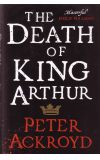
28 Dec 2011 10:06:52
Arthur is certainly several parts beast. His manners, like the narrator of Hughes's famous early poem "Hawk Roosting", often consist of "tearing off heads". When ambassadors from Lucius Iberius, emperor of Rome, arrive at Arthur's Christmas court in Carlisle (this is a northern poem) demanding fealty from the British king and commanding him and the Round Table knights to appear in Rome, it looks as though they might be leaving with their heads under their arms like the Green Knight in the poem next door. But Arthur treats them with terrifying courtesy before announcing his plans to invade Europe.
There's no room for the D-Day secrecy of Operation Overlord here:
Then will I move through the mountains and march on his heartlands,
to marvellous Milan to wallop down its walls.
In Lorraine and Lombardy I will leave not one man
who lives by his laws or is loyal to his cause,
then turn into Tuscany at a time that suits me
and ransack wide regions with my riotous knights.
The present-day resonance of this is hard to miss, with the Roman empire as the EU demanding a renunciation of British sovereignty. The poem could have been written for Eurosceptic MPs to dream over. If they are in a sense the officer class, Arthur's forces invade Europe with an indiscriminate savagery whose tribal echo can be found among their troops – the bullet-headed hordes of football thugs travelling abroad nowadays under the flag of St George. A ruck's a ruck, wherever it may be.
Armitage handles the alliterative verse with great energy and verve, attaining the momentum of a siege-tower falling off a cliff, and relishing the opportunity for comic boastfulness and gluttonous, bloodthirsty comedy. Before setting out for Rome, Arthur tackles the cannibal monster of Mont Saint-Michel, who "was bulky as a sea-pig with a brawny body, / and each quivering lump of those loathsome lips / writhed and rolled with the wrath of a wolf's head". With a generation of children raised on Horrible Histories, Armitage's version might do for alliteration what Eliot's Practical Cats once did for rhythm.
When battle is joined near the river Seine, it goes on for pages, in what Armitage might describe as a delirium of disembowelment. From time to time it's hard to know who's doing what to whom, except that it's grotesque and fatal. So great is the slaughter that it's surprising the continent is not depopulated. We seem to be reading about the hundred years' war, which was contemporary with the poem's composition, but also unavoidably looking forward to the catastrophes of the thirty years' war and the first world war. In victory, Arthur thanks "Christ and his cherished mother", and in Christ's name invites his forces to help themselves to the treasures of Toulouse. The emperor responds by dispatching a host of Saracens, and after a ritual exchange of insults – "truss up your trumpets and trifle no longer" – it all kicks off again, and again ("fifty thousand folk were quickly felled").
When Arthur finally kills Emperor Lucius it merely marks a pause in the larger conflict. Seemingly invulnerable, as great as Alexander, the king looks down on Lombardy from the Alps, declaring: "I am lord of this lovely land, I believe", in hubris forgetting his debt to the Almighty. He carries on "toppling towers and tormenting the locals", before Rome surrenders and he turns to contemplate a new crusade. That night he dreams of Lady Fortune, who tells him: "all you love you shall lose, and your life as well. / You have loitered in privilege and pleasure too long." Her resemblance to Chancellor Merkel is purely accidental.
Repent and build abbeys, says Arthur's adviser. Turn home to confront Mordred, the enemy within. You have wasted too much time on foreign policy. Remember you must die. And off Arthur gallops, back over the border between nation and myth, well served by Simon Armitage. Imaginatively, The Death of King Arthur isn't a patch on Gawain, but it certainly rips and roars and ravishes in handling one idea of the Matter of Britain. It would also make a great computer game – or perhaps a new Frank Miller movie to follow 300, even though it lacks Miller's humane liberal irony.

